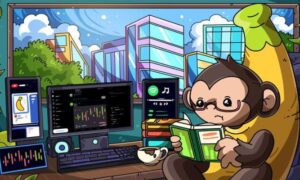The phenomenon of mobile phone apps continues to transform the world: from the opportunities it gives to order a taxi to the way that it allows instant groceries deliveries, the app ecosystem has given a new lease of life to the economy – and consumer experience – in so many important ways.
However, what fewer people are aware of is the way that the app world has transformed the forex industry. Forex trading apps have proliferated in recent years, and it’s easy to see why: these apps offer a chance to keep up to date with the latest events in the market, and make the taking of real-time trading decisions possible. On a broader level, they have also allowed for a change in the demographic make-up of the trading industry. This blog post will explore in further detail what these changes look like and how they are likely to affect the trading industry going forward.
Responsive trading
One way that the forex trading world has changed as a consequence of increased app availability is when it comes to response times. Previously, traders who were trading on thin time margins – such as those who are following intraday strategies in which small hour-on-hour fluctuations can make a big difference – had to be glued to their terminals in order to be present to make trading decisions.
Using tools such as stop losses offered a chance to mitigate this a little and allow for some flexibility. However, the reality is that intraday traders need to have the chance to dip in and out of their open positions across the whole of the day, and there’s a significant risk of loss if they’re away from their desk and unable to take action in the event of a market drop.
Mobile trading apps have given traders in this situation a chance to introduce more flexibility into their days. While the mobile apps offered by major trading software providers such as MetaTrader do not always contain all the same features as the terminal, desktop, or even web trading versions, they do offer enough for markets to be tracked on the go – which can make all the difference between a big loss and a small loss. Checking out broker reviews on a top site such as Forex Fraud is an ideal way to check what your preferred potential broker can offer in this regard: that way, you won’t get caught out with a mobile trading app that doesn’t meet your specific needs.
Trader demographics
More broadly, the existence of mobile trading apps has also had a big effect on the demographic make-up of the trading world. Before the disruption caused by internet-based trading, the career was only really available to those who lived in a location with a trading industry hub nearby – or who had the ability to commute to one. It was also only available to those with the cultural capital or economic background to get a place.
Now, however, this has changed altogether. It is possible for pretty much any adult to sign up for a mobile trading account – and while this doesn’t mean that they will necessarily have the skills to make a profit, it does mean that there’s a much more inclusive and accessible trader base out there than ever before.
Mobile trading, in particular, means that it’s now not necessary to devote a whole career to trading. Alert and notification systems on mobile trading apps mean that traders can fit their trading around other commitments, such as work, and focus their attention on their open positions only when it really matters. This might not necessarily be enough for their trading strategy to work, but it at least gives them an increased chance of success.
For those with jobs or responsibilities that have to happen at certain times, it’s a valuable opening into a trading side hustle: this particularly benefits those who previously have been excluded, such as carers or those who look after children. Opening or closing a position just before doing the school run is now a possibility – for the first time ever.
Overall, trading apps have had a profound effect on the way that the trading sphere works. First off, it has democratized the industry by opening up new avenues for those who previously were unable to trade to do so. It has also given all traders the chance to be more flexible, responsive and nimble in their trading practices – leading, in some cases, at least, to reduced losses.



































